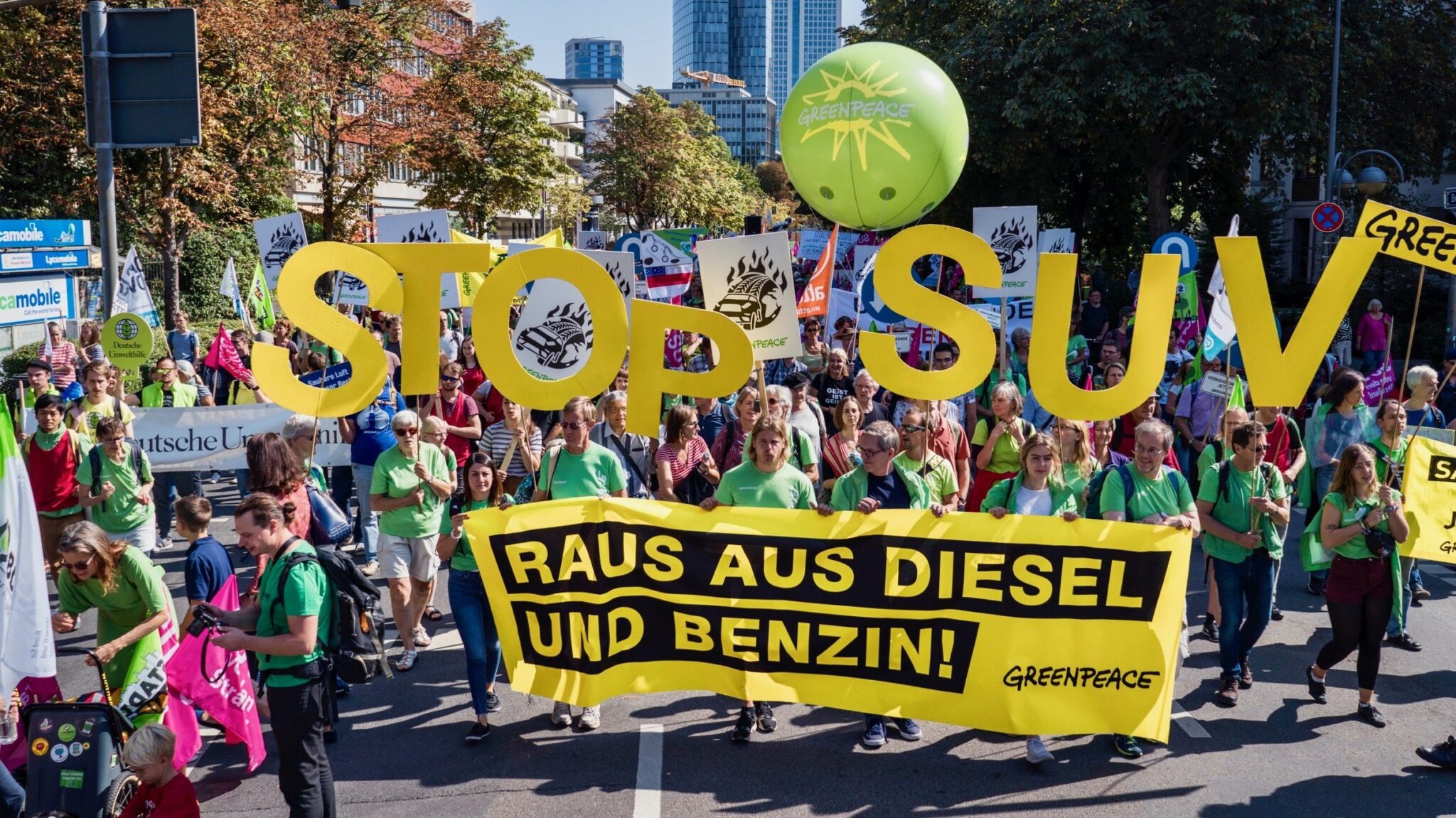

At the International Motor Show (IAA), climate protestors are calling for a change in transportation politics. © Kevin McElvaney / Greenpeace
Thousands of protestors marched in front of Frankfurt’s International Motor Show (IAA) on Saturday to show their disgust with the auto industry’s role in the climate crisis. The protestors demanded an end to combustion engines and a shift to more environmentally friendly emissions-free vehicles, as Reuters reported.
Hundreds donned white hazmat suits and blocked the entrance to the show while holding up placards that said “Disempower car companies,” “STOP SUV,” “SUV not cool” and “we can’t replace our lungs,” as CNN reported.
In addition to the protestors blocking the entrance, police estimated that nearly 15,000 cyclists joined a peaceful march. Organizers estimate the total number of people taking part in the demonstration was 25,000 with 18,000 cyclists descending on the city, according to Reuters.
“We’re taking a clear stand against the destructive transport system for which the world’s largest motor show still stands,” the organizers said, as News Corp Australia reported.
The demonstrators campaigned for car-free cities, free public transportation, and an increase in cycle paths.
“A real change towards climate-friendly transport is not compatible with the profit interests of the car lobby,” said organizers, according to News Corp Australia.
The organizers were disappointed by the trends they saw at the IAA.
“Just under three-quarters of the 50 new cars displayed (at IAA) continue to use environmentally damaging diesel and petrol,” said Greenpeace in a statement in support of the IAA protests, according to according to Deutsche Welle.
However, they were thrilled with the turnout, as the cyclists brought traffic to a crawl on several major motorways as they made their way to the IAA protest, as Deutsche Welle reported.
The number of people, “willing to take part in a civil disobedience campaign and put their bodies in the way of the powerful auto industry” had exceeded their expectations, said Marie Klee, a spokeswoman for the climate action group Sand in the Gearbox, as CNN reported. “An IAA in this form will most certainly not exist anymore. The days when VW, Daimler and BMW and co. celebrated their destructive tin cans without any interruption are over,” she said.
Die Hauptwache in Frankfurt füllt sich – kommt vorbei und setzt euch mit uns für die #Verkehrswende ein! Wir freuen uns auf eine bunte und laute Demo mit euch! #aussteigen pic.twitter.com/u27gxsh3YL
— Greenpeace e.V. (@greenpeace_de) September 14, 2019
For their part, Germany’s big three, Volkswagen, Mercedes-Benz maker Daimler, and BMW, operate under the assumption that in 10 years about half of their cars will be emissions-free, according to Reuters.
However, Volkswagen’s diesel emissions scandal from four years ago, in which the automaker admitted to cheating emissions tests, has created distrust amongst the public. Environmentalists have criticized automakers for shirking their environmental responsibilities and dragging their feet on a transition to emissions-free vehicles, according to News Corp Australia.
Greenpeace noted that the automakers have outsized responsibility to respond to the climate crisis, especially since a report last week found that cars from Germany’s big three produced more CO2 emissions in 2018 than the country itself produced, as Deutsche Welle reported.
The Greenpeace report, Crashing the Climate: How The Car Industry is Driving the Climate Crisis, calls for an end of all sales of diesel and gas powered cars by 2028 — a target the auto-industry does not find realistic.
Marion Tiemann, a Greenpeace transportation expert, warned that Chancellor Angela Merkel could “no longer sit by and watch as car executives put on green crowns, while continuing to develop and sell climate-damaging diesel and petrol vehicles,” as CNN reported.
Merkel did open the IAA show on Thursday. While she did not say any new regulation is coming down the pike, she offered a warning about the climate crisis and asked the automakers to prioritize producing more affordable and sustainable electric vehicles.
“High mobility will have its price, if more efficient, climate-friendly vehicles are not manufactured,” she said, as CNN reported.

 233k
233k  41k
41k  Subscribe
Subscribe 